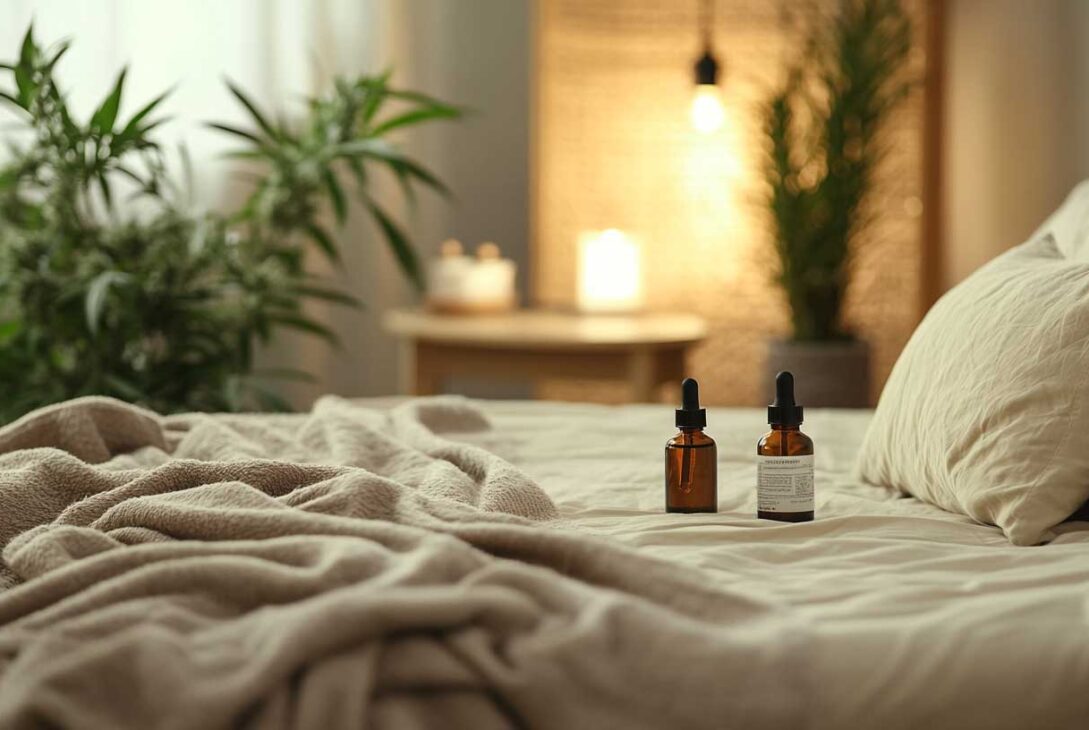Introduction
In our fast-paced world, where the pressures of everyday life often weigh heavily, quality sleep can sometimes feel elusive. Alarmingly, studies suggest that around two-thirds of adults in the United States grapple with insomnia or other sleep disturbances. As many search for remedies, Cannabidiol (CBD) has emerged as a beacon of hope. This non-psychoactive compound derived from hemp is capturing attention for its potential to foster calm and improve sleep quality. In this exploration, we’ll uncover how CBD works to enhance rest, its comparisons to traditional sleep aids like melatonin, and practical tips for integrating it into your nightly routine.
Understanding CBD and Its Effects on Sleep
How CBD Affects Sleep
At the heart of CBD’s influence on sleep lies its interaction with the endocannabinoid system (ECS), which governs various bodily functions, including the sleep-wake cycle. Here are some pivotal ways CBD can aid in achieving a restful slumber:
- Reducing Anxiety and Stress: Many individuals struggle with rumination and anxiety, which can lead to tossing and turning at night. Research has indicated that CBD may effectively reduce anxiety levels, creating a more serene state conducive to sleep.
- Managing Pain: Chronic pain is another culprit disrupting sleep routines. CBD has demonstrated analgesic properties that may alleviate discomfort, enabling better relaxation and deeper sleep.
- Improving Sleep Efficiency: While more research is needed, some studies imply that CBD could enhance the overall sleep experience over time, potentially leading to longer periods of uninterrupted rest.
Forms of CBD for Sleep
CBD is available in a variety of forms, each catering to different preferences and needs:
- Oils and Tinctures: Highly favored for their rapid absorption and versatility, these can be taken directly under the tongue or added to beverages.
- Pills and Capsules: Offering precise dosing, these formats are ideal for those who prefer a straightforward approach to supplementation.
- Edibles: Think CBD-infused gummies or chocolates. These are appealing due to their taste and longer-lasting effects as they are metabolized slowly.
- Vape Concentrates: Though absorbed quickly into the bloodstream, vaping might not be the safest option for everyone, especially concerning long-term use.
Comparing CBD with Melatonin
How Melatonin Affects Sleep
Melatonin’s role in the body is to regulate the circadian rhythm, signaling when it’s time to sleep. Let’s see how melatonin contrasts with CBD:
- Regulating Circadian Rhythm: Melatonin supplements are recently popular for addressing disruptions in sleep patterns, such as those caused by travel or shift work.
- Optimal Timing: For melatonin to be most effective, it’s typically best taken a few hours before bedtime, aligning with the body’s natural production cycle.
CBD vs. Melatonin: Which is Better for Sleep?
- CBD for Comfort and Relaxation: CBD suits those whose sleep is disrupted by stress, pain, or anxiety, promoting relaxation at any hour.
- Melatonin for Circadian Regulation: Conversely, if your primary concern is disrupted sleep patterns tied to your body clock, melatonin might be your go-to solution.
Practical Tips for Using CBD for Sleep
Dosage and Timing
- Dosage: The right dosage for CBD can vary widely among individuals. Research suggests that higher doses could be more effective, with studies noting positive outcomes at around 150 mg taken nightly for improved sleep efficiency.
- Timing: While personal experiences may differ, taking CBD about an hour before bedtime can help set the stage for a peaceful night.
Potential Side Effects
- Common Side Effects: While CBD is generally safe, some individuals may experience mild effects such as dry mouth or changes in appetite. In contrast, melatonin can occasionally lead to next-day grogginess and vivid dreams.
Market Impact and Trends
Growing Demand for CBD Products
The rise in interest surrounding CBD can be attributed to heightened awareness regarding its potential benefits, as well as an overall shift in societal attitudes towards hemp-derived products.
Innovations in CBD Products
The CBD market is abuzz with creativity, offering an array of innovative products tailored for sleep. From advanced CBD-infused sleep gummies to specialized oils that blend CBD with melatonin, consumers have a wealth of choices designed to tackle sleep issues from different angles.
Conclusion
As many seek solutions for sleepless nights, CBD offers a promising alternative, particularly for those dealing with anxiety, stress, or pain-induced insomnia. While it may not universally resolve all sleep complications, its ability to encourage relaxation and well-being makes it a noteworthy option in the quest for better sleep.
Key Takeaways
- Consult a Healthcare Professional: It’s essential to speak with a healthcare provider before starting any new supplement, including CBD, to ensure it’s appropriate for your health needs.
- Combine with Healthy Sleep Habits: To maximize the benefits of CBD, integrate it with solid sleep hygiene—consistent sleep schedules, a calm pre-sleep routine, and a restful sleep environment are crucial.
- Monitor and Adjust: Keep a journal to track how CBD affects your sleep. This can help you fine-tune the dosage and timing to fit your unique body response.
Incorporating CBD into your sleep strategy may provide a pathway to improved rest and relaxation, nurturing not just sleep but your overall well-being. As with any wellness approach, awareness and adaptability are key.





















